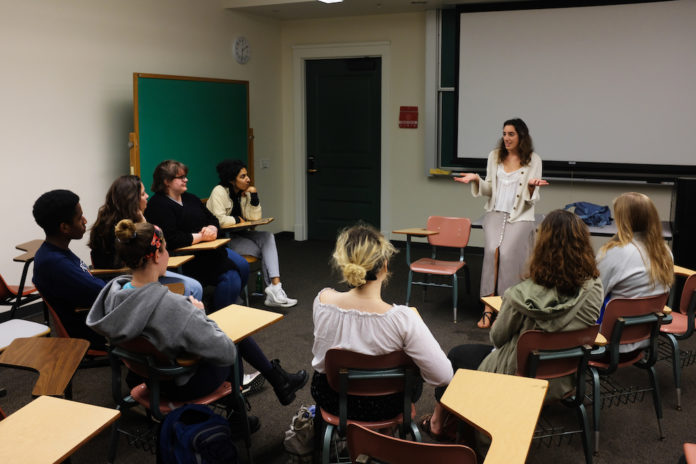
At Occidental College, in order to graduate, a student must reach 102-level proficiency in a language other than English, as per the college’s core requirements. The college offers coursework in nine foreign languages, but in LA where an estimated 43 percent of residents speak Spanish at home, professor Alicia González said taking Spanish is a no-brainer.
“Well, in Southern California, I think there’s just no question. It’s really practical,” González said. “You can walk out of the classroom and use it. Even on the campus, there are a lot of people that speak Spanish.”
Lana Parke-Reimer (sophomore) is a Spanish major and intends to minor in linguistics and education. Having studied Spanish since seventh grade, Parke-Reimer said Spanish is always around her and knowing the language helps her connect with people on another level.
“A lot of times, I’ll talk to Uber drivers in Spanish or a lot of the workers at Oxy in Spanish,” Parke-Reimer said. “And some of the Oxy workers — I think they might be more comfortable speaking Spanish, so it’s nice for them to be able to speak in their native language instead of English.”
Spanish professor Gloria Orozco Allan said although foreign language is often considered a less important subject, there is much more to language learning than meets the eye.
“When you learn a language, you’re also learning a way of thinking that’s different, and it comes with a whole other mindset. So it’s kind of a door to another world,” Orozco said. “The language is not just on its own, but [it’s] with a culture.”

Many Americans pursue a foreign language in order to be more competitive in labor markets, but Carmel Levitan, cognitive science professor and cognitive science department chair, enrolled in Spanish 101 at Occidental in Spring 2017.
“I did a lot of travel around the world and I was like, ‘I should have taken Spanish.’ And then I moved back to Los Angeles and I was like, ‘I really should have taken Spanish,’ because it’s so valuable,” Levitan said. “It’s just a skill that adults should have — speaking multiple languages.”
Levitan said learning Spanish was not about brightening career prospects because she was already employed when she started taking courses. However, according to Levitan, everyone should learn a foreign language anyways because they force you to think in a different way and they broaden access to opportunities.
“I think my life would be better with Spanish in it,” Levitan said. “I’d like to travel, but also just navigating Los Angeles, there are conversations you can have with people who don’t necessarily speak English.”
According to Spanish professor María Castro, in many countries around the world, children study foreign languages from the beginning of primary school. Castro said in California, where so many people speak Spanish as their first language, learning Spanish should be required.

However, deciding to study a language is only the first step. Many people find learning and retaining a language to be rather difficult.
Ian Zunt (senior), an Urban & Environmental Policy (UEP) major minoring in Spanish studies and art history, and he studied abroad in Madrid, Spain Fall 2018. Zunt said being able to communicate and having an alternative way to connect with people was very appealing to him, but although he studied Spanish since eighth grade, he still had difficulty speaking and listening in Spanish by the time he went abroad.
“I think I had good grammar and vocab, but just being able to — first of all — listen and understand when people are speaking so rapidly, that was definitely something that was not a strong suit before going abroad,” Zunt said. “Also being able to just think on the spot in a different language is something that I had never experienced before.”
According to Castro, depending on what a student wants to acheive by learning a language, correct grammar can be necessary to learn. However, Castro said it is important for people to learn to speak a language before focusing on grammar — as is natural when children first learn their native language.
“You don’t learn grammar when you are a little kid. When you grow up in your family, when you go to school, they don’t teach you grammar structures — even in English. They teach you grammar structures later on, so you can understand how the language works, but not from the beginning,” Castro said.
González, on the other hand, said she is sure she has a reputation for being heavy on grammar.
“I enjoy grammar, so I enjoy teaching grammar. And then at Oxy, because it’s a college environment, it’s very heavily weighted for, in particular, being able to read and write,” González said. “So we really encourage our students from the second year level on to take the conversation classes, because [Spanish Studies classes] aren’t conversational classes.”
Whether Spanish language learners’ goal is to reach conversational fluency, or to read and write in a bilingual work environment, one piece of advice was repeated by professors and students alike.
“Practice not being shy — overcoming the fear of being wrong,” Levitan said. “It’s better for me to say a sentence and use the wrong past tense than to stay quiet because I haven’t mastered the grammar.”
![]()



































